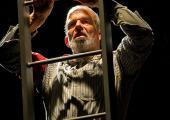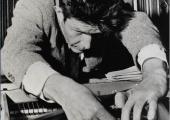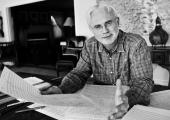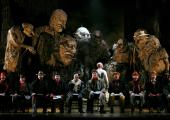In The Penal Colony, Music Theatre Wales, Linbury Studio Theatre




A packed Festival Hall and a cheering, stamping, standing ovation – hardly the usual welcome for an evening of contemporary music. Sitting, wizened and waistcoat-clad, at the centre of the front row was the reason: Ravi Shankar. Framed by the mathematical minimalism of John Adams’ Shaker Loops and Philip Glass’s Violin Concerto No. 1, Shankar’s first-ever symphony was last night given its world premiere by the London Philharmonic Orchestra.


As in his first concert this season with the London Symphony Orchestra on Sunday, Adams the composer-conductor moved last night from the natural phenomena of an older master to his own illuminated chronicle of man-made unease. City Noir, his latest orchestral symphony in all but name, bears his trademark knit of rhythms both bludgeoning and capricious with sinuous melodic nocturnes: the mixture rather as before, but with a fresh twist of LA jazz. You'd think the marriage of harmony and invention would free up his conducting of other men's music. Oddly, though, that remained doggedly beat-bound, to be saved at the last minute by Jeremy Denk's astounding sense of fantasy in Stravinsky's Concerto for Piano and Wind.As in his first concert this season with the London Symphony Orchestra on Sunday, Adams the composer-conductor moved last night from the natural phenomena of an older master to his own illuminated chronicle of man-made unease. City Noir, his latest orchestral symphony in all but name, bears his trademark knit of rhythms both bludgeoning and capricious with sinuous melodic nocturnes: the mixture rather as before, but with a fresh twist of LA jazz. You'd think the marriage of harmony and invention would free up his conducting of other men's music. Oddly, though, that remained doggedly beat-bound, to be saved at the last minute by Jeremy Denk's astounding sense of fantasy in Stravinsky's Concerto for Piano and Wind.

What would you imagine the composer John Adams might choose to conduct – apart, that is, from a little something he himself made earlier? Well, the first of two London Symphony Orchestra concerts this week brought no big surprises: Sibelius’ Sixth Symphony was in essence a little like returning to his minimalist roots – a bunch of insistent melodic cells and dancing ostinati. Flanking it, as if to reassert that everything Adams writes is essentially operatic, was orchestral music born of opera: Adams’ own Doctor Atomic Symphony and the “Four Sea Interludes” from Britten’s Peter Grimes. Adams, the conductor, had his work cut out.

Tim Henman - brilliant and unfairly treated, or... not? Even when John McEnroe passionately enumerates Henman’s qualities, do you both nod hopefully and realistically shake your head? Because, yes, our lad may be a rare craftsman of the grass court game, but if the point is giving us the shock of unexplained genius that is, say, Federer's (or McEnroe's) habit, then no chance, mate.

It has always been a cornerstone of my personal philosophy that beauty and insight can be found in the very lowest of common denominators. That Big Brother, Friends, Love It magazine or Paris Hilton provide revelations about life that are of as much consequence, of as much wonder, as any offered up by the classic pantheon. That that which the people respond to must and usually does have plenty of merit lurking within it.

Nico Muhly didn't have to work much to puncture any atmosphere of classical recital formality at the Roundhouse: he only needed to be himself. Young, slightly dorky and very camp, wearing a black garment that blurred the boundaries between cardigan and bathrobe, and bantering lightly with the audience, the Vermont-born New York-based composer gave the impression that he couldn't take himself too seriously if he tried.